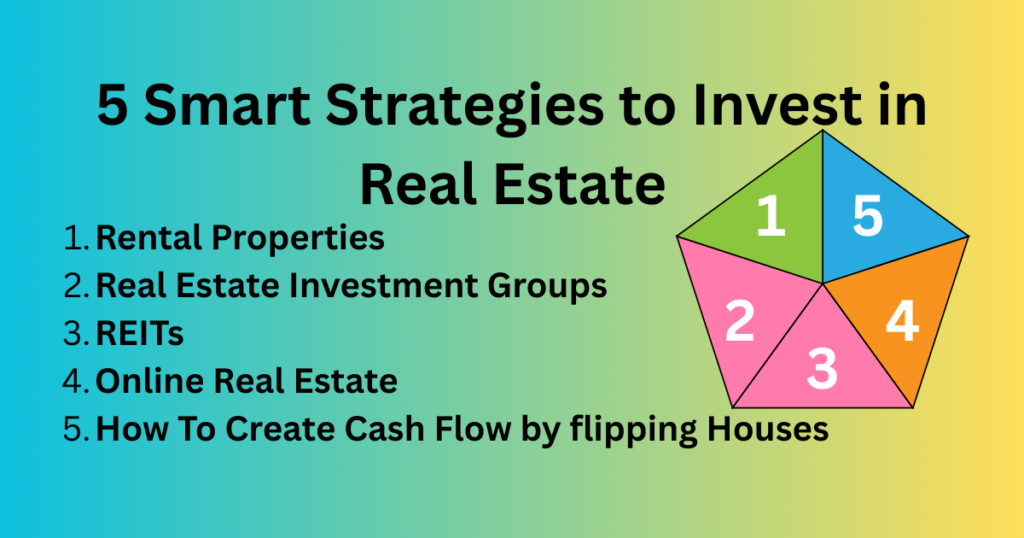Real estate has always been the most lucrative avenue of investment with stability, a stream of passive income, and the ability to generate significant amounts of money in the long run. There are many ways for you to succeed in Real Estate if you are wondering How to Invest in Real Estate. For those who want to run Rental Property Investments or other hands-off approaches to Real Estate Investment Trusts (REIT), the investment options are many. Here is the guide that will tell you about the best Ways to Invest and the Ways to Tap into the Potential of this dynamic market.
1. Rental Properties: A Reliable Path to Wealth Creation
Rental Property Investment is one of the traditional Ways to Invest in Real Estate where you will rent the property for a certain number of years to tenants, an investor can purchase a residential or commercial property and rent it out to tenants to generate constant rental income with a property appreciation tie. This strategy will build your long-term wealth and financial independence, this strategy used by many successful investors.
Tax benefits through depreciation and deductions
| Pros | Cons |
| Steady cash flow from rental payments | Requires property management and maintenance |
| Tax benefits through depreciation and deductions | Tenant-related issues can be time-consuming. |
| Ability to use financing to purchase additional properties. | The demand for rentals may be affected by market fluctuations. |
| Hedge against inflation as property values increase over time | There is added complexity of legal and regulatory requirements. |
2. Real Estate Investment Groups (REIGs): The Easy Way to Own Property
Real Estate Investment Groups (REIGs) offer an appealing solution for those who are interested in benefits associated with Rental Property Investment without the burden of direct ownership. These are groups that collect pool investors’ funds, to purchase and manage properties, with a no-hand approach. It allows real estate investment to individuals who want a less active role.
| Pros | Cons |
| Professional management handles property operations. | Profits can be eaten by management fees. |
| Potential for passive income | Lack of control over investment decisions |
| Risk-sharing among multiple investors | A higher minimum investment is required by some REIGs. |
| No direct management of diversified real estate portfolio | Returns may be below direct property ownership. |
3. How To Create Cash Flow by Flipping Houses
House Flipping is an interesting and profitable business for those who like finding undervalued properties and enjoy renovation. This is the purchase of distressed properties, renovating them, and selling at a higher price. It needs to have a deep understanding of the real estate market and renovation costs.
| Pros | Cons |
| High-profit potential in a short time | Requires significant upfront capital |
| Opportunity to add value through the Renovations. | Market timing is crucial. |
| No long-term tenant management hassles | Unexpected renovation costs can lower profits. |
| It can be scaled into a full-time business. | High competition in popular markets |
4. REITs: Investing in Real Estate Without Owning Property
REITs (Real Estate Investment Trusts) provide an ideal alternative if you want to invest in real estate without dealing with property management. Companies that own and operate income-producing real estate but allow investors to buy shares like stocks. This is a good way for individuals seeking real estate exposure in a diversified portfolio.
| Pros | Cons |
| Passive income through dividends | No control over property management |
| As compared to physical real estate, it has a high liquidity. | Subject to stock market volatility |
| Diversification across multiple properties | Dividend yields can fluctuate. |
| Less difficult to enter than investing directly in property | Some REITs also have high management fees. |
5. Online Real Estate: The Future
Thanks to the latest technology, Online Real Estate Platform is an innovative investment in real estate. These are platforms that will connect investors to developers who seek funding for real estate projects through crowdfunding models. Thus, investors do not require large amounts of capital to take part in real estate projects.
| Pros | Cons |
| It also requires lower capital for the purchase than direct property ownership. | Limited liquidity with long investment lock-up periods. |
| Access to various real estate projects | Platform fees can reduce earnings. |
| Potential for high returns | Risk of project failure |
| Opportunity for investment in Commercial and residential developments. | Some platforms need to be accredited or require high minimum investments. |
Understanding the Real Estate Market: The Key to Smart Investing.
Different factors such as interest rates, economic situation, and local demand-supply dynamics influence the Real Estate Market. To make good investment decisions on time, successful investors keep them updated about market trends and economic indicators.
Key Factors to Watch:
- Lower interest rates make financing more affordable.
- A strong job market is likely to boost housing demand as it does create jobs.
- The real estate appreciation is being driven by growing populations.
- Changes in regulations can change the property values.
- New transportation and amenities will encourage property demand.
Choosing the Right Investment Strategy: Tailor Your Approach
When it comes to Strategies to Invest in Real Estate, it is significant to set your strategy according to the works consistent with the financial aim, hazard level, and available capital. To diversify risks and rewards, investors can, therefore, build a balanced strategy using rental properties, REITs, and digital platforms.
Key Considerations:
- Do you wish to make capital appreciation or passive income?
- How much risk is it worth to take?
- What level of involvement suits your lifestyle?
- Do you have the ‘know-how’ to work with properties or renovations?
Additional Real Estate Investment Opportunities
Apart from the primary ways, there are additional Ways to Invest in Real Estate, such as:
- Renting out property on short-term platforms such as Airbnb is lucrative, especially in tourist-friendly areas.
- Real Estate Syndications are a way for Investors to put funds together to purchase large properties and share profits usually done in a commercial real estate venture.
- Buying of undeveloped land and selling after appreciation or developing it into residential or commercial spaces.
- Finding undervalued properties and selling other investors a contract to buy the undervalued properties.
- Investing in properties that are made up of residential, commercial, and retail spaces in a single project.
What’s Next? The Future of Real Estate Investing
The Real Estate Market is changing and new trends are arising that will give rise to new opportunities for investing in the future. Some key developments include:
- Investors aim to provide diverse options to meet growing demands and government regulations, using sustainable and green buildings.
- With a rise in urban centres the Shared Housing Models are gaining popularity, especially for digitally nomad people and young professionals.
- The Changing work environment creates the need for changing housing preferences and investment strategies which is leading to a rise in demand for suburban and rural property.
- Real estate investment is becoming more flexible and transparent with blockchain in the real estate sector: tokenization of the property assets.
Final Thoughts: Your Journey to Real Estate Success
The way you should go about How to Invest in Real Estate successfully is to choose the right strategy that fits your financial goals and lifestyle. Regardless of whether you invest through Rental Property Investment, House Flipping, or REITs, the most important thing to do is to keep abreast of the information and make calculated decisions. By investing your money in the right ways, the path can be sustainable towards financial freedom & generating long term wealth in the real estate. start Today to explore opportunities and be a part in the evolution of Real Estate Market!
Also Read : The extension of this proposed line will make the journey from Jewar Airport to Noida by NaMo Bharat very smooth.




